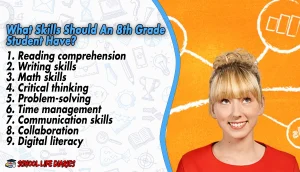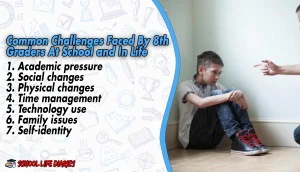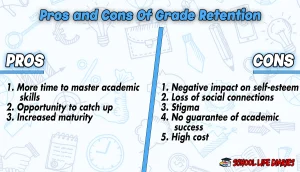The 8th grade is a crucial stage in a student’s academic journey, typically marking the transition from middle to high school. At this age, students are around 13 to 14 years old and are expected to have a good grasp of the basic knowledge and skills taught in the preceding grades.
The 8th Grade curriculum focuses on preparing students for the rigors of high school and beyond, and usually includes advanced studies in mathematics, science, history, and English.
Students are also expected to develop critical thinking and problem-solving skills, as well as good study habits and time management skills, all of which are essential for success in higher grades and in their future careers.
Age-Grade Chart
Let’s look at the age requirements for 8th Grade. In the United States, the minimum age for an 8th Grade is typically 14, but this can vary depending on the state and school district. Some states have early entrance or acceleration policies that allow students to start high school at a younger age.
For example, in California, students can enter 8th Grade at the age of 14 if they meet certain academic and maturity requirements. These policies can affect a student’s age in 8th Grade, as some students may be younger or older than their peers.
| Age | Range | Students Called |
| Kindergarten | 5-6 | Kindergartners |
| 1st grade | 6-7 | 1st graders |
| 2nd grade | 7-8 | 2nd graders |
| 3rd grade | 8-9 | 3rd graders |
| 4th grade | 9-10 | 4th graders |
| 5th grade | 10-11 | 5th graders |
| 6th grade | 11-12 | 6th graders |
| 7th grade | 12-13 | 7th graders |
| 8th grade | 13-14 | 8th graders |
| 9th grade | 14-15 | Freshmen |
| 10th grade | 15-16 | Sophomores |
| 11th grade | 16-17 | Juniors |
| 12th grade | 17-18 | Seniors |
What Is 8th Grade Called?
8th grade is often referred to as “Middle School Year 8” or “Eighth Grade.”
Is There A Minimum Age For 8th Grade?
There is no universally fixed minimum age for 8th grade. The age at which a student enters 8th grade can vary depending on factors such as school district policies, individual school policies, and a student’s academic progress.
In general, students typically enter 8th grade at around 13 to 14 years old, but some may be younger or older.
Is It Better To Start School At An Earlier Age?
The debate over whether it is better to start school at an earlier age or a later age is ongoing and controversial. Some believe that starting school earlier can give students a head start and set them up for long-term success, while others argue that starting school later allows students to develop at their own pace and reduces stress and burnout.
The best approach may depend on individual circumstances, such as a child’s developmental readiness, family background, and other factors. Ultimately, the decision of when to start school should be based on a careful evaluation of the child’s needs and abilities, in consultation with educational professionals.
What Time Do 8th Graders Start School?
The start time for 8th Graders can vary depending on the school, school district, and region. In general, school start times for middle schools, including 8th grade, range from 7:30 a.m. to 9:00 a.m.
Some schools may have earlier or later start times, depending on factors such as transportation schedules, school size, and other considerations. It is important to check with the specific school for their start time for 8th-graders.
Can You Be 15 Or 16 In 8th Grade?
Yes, it is possible for a student to be 15 or 16 years old and still be in 8th grade. The age at which a student enters 8th grade and their progression through the grades can depend on a variety of factors, such as their academic progress, school district policies, and individual school policies.
Some students may advance more quickly through the grades and be older than their peers, while others may take longer and be younger. The important thing is for students to progress at a pace that is appropriate for their individual needs and abilities.
In What Category Do Most 8Th Graders Take Up Residency Age Are Most 8Th Graders?
Most 8th graders are typically 13 to 14 years old and can be considered to be in the adolescent or teenage age category. This is a time of significant physical, emotional, and intellectual growth and development, as students make the transition from childhood to adulthood.
At this age, students are faced with new challenges and responsibilities as they prepare for high school and beyond, and are expected to take on a more active role in their own education and personal development.
Would You Be Able To Be 15 In Class U Be 15 In 8Th Grade?
Yes, it is possible for a student to be 15 years old and still be in 8th grade. The age at which a student enters 8th grade and their progression through the grades can depend on a variety of factors, such as their academic progress, school district policies, and individual school policies.
An Individual Who Is 15 Years Of Age Must Be On Grade Play.
This statement is not necessarily true. The grade level of a student is not solely determined by their age but can depend on a variety of factors such as academic progress, school district policies, and individual school policies.
Can 8th Grade Students Be Promoted To 9th Grade Without Exams?
It depends on the school district and individual school policies. In some cases, promotion from 8th to 9th grade may be based solely on academic performance and satisfactory completion of coursework, without the need for exams.
In other cases, exams or other assessments may be required for promotion. The specific promotion policies can vary widely, and it is important to consult with the individual school or school district for details on their requirements.
Which Type of Exams Are Conducted For 8th Grade Students?
The types of exams conducted for 8th-grade students may vary depending on the country or region. However, in general, 8th-grade students may be required to take exams in subjects such as mathematics, science, social studies, language arts, and foreign languages.
These exams may be standardized tests, state or provincial assessments, or end-of-year exams created by the school or school district. Additionally, some 8th-grade students may be required to take high school placement exams or college entrance exams, depending on their academic track and goals.
Factors That Affect The Age of 8th Graders
The age of 8th graders can be affected by several factors, including:
1. Birthdate:
The age of a student in 8th grade is primarily determined by their birthdate. Generally, students in 8th grade are between 13 and 14 years old.
2. Cut-off dates:
Some schools or school districts may have cut-off dates for determining when a student should start a particular grade. For example, some schools may require students to be a certain age by September 1st to be eligible for 8th grade.
3. Grade retention:
Students who have been held back or repeated a grade may be older than their peers in the same grade.
4. Accelerated programs:
Some students may be enrolled in advanced or accelerated programs that allow them to skip grades or take higher-level courses at an earlier age.
5. Homeschooling:
Homeschooled students may have more flexibility in terms of grade placement and may be placed in a grade based on their academic ability rather than their age.
6. International students:
The age of 8th graders can also vary for international students who may be following a different educational system or may have different age requirements for each grade level in their home country.
Senior High School In The US
In the US, senior high school is typically the final stage of a student’s secondary education, following middle school or junior high school. Senior high school usually encompasses grades 9-12, and students are typically between 14 and 18 years old.
During senior high school, students are required to earn a certain number of credits in various subjects, such as English, math, science, social studies, and electives. These credits are typically earned by successfully completing courses, and students must meet minimum requirements to graduate.
In addition to academic coursework, senior high school students may participate in a wide range of extracurricular activities, including sports, music, drama, and clubs. They may also have opportunities to take advanced courses, such as Advanced Placement (AP) classes, which can earn college credit.
Graduating from senior high school is an important milestone for students in the US, as it is typically required for admission to most colleges and universities.
Graduating seniors may participate in a formal commencement ceremony and receive a high school diploma, which represents their successful completion of the academic requirements for high school graduation.
What Skills Should An 8th Grade Student Have?
An 8th-grade student should have acquired a range of skills to help them succeed academically and socially. Some skills that an 8th-grade student should have include:
1. Reading comprehension:
The ability to read and understand texts of varying complexity is essential for success in all academic subjects.
2. Writing skills:
Students should be able to write effectively, using proper grammar and sentence structure, to convey their ideas in a clear and organized manner.
3. Math skills:
Students should have a strong foundation in basic math skills, such as arithmetic, algebra, geometry, and data analysis.
4. Critical thinking:
The ability to analyze information, evaluate arguments, and make informed decisions is an important skill that students should develop in 8th grade.
5. Problem-solving:
Students should be able to identify problems, brainstorm solutions, and implement strategies to solve them.
6. Time management:
Students should be able to manage their time effectively to balance their academic workload, extracurricular activities, and personal responsibilities.
7. Communication skills:
Students should be able to communicate effectively with peers, teachers, and other adults, both orally and in writing.
8. Collaboration:
The ability to work effectively in a team, listen to others, and contribute to group projects is an important skill that 8th-grade students should develop.
9. Digital literacy:
Students should have basic knowledge of technology and digital tools, including how to research and communicate online, and how to use software applications for various tasks.
What Subjects Do Eighth Graders Learn (U.S. vs. U.K. vs. China)
The subjects that eighth graders learn in the U.S., U.K., and China can vary slightly. Here is a general overview of the subjects eighth graders learn in these countries:
1. United States:
In the U.S., eighth-grade students typically take classes in the following core subjects:
- English Language Arts
- Mathematics
- Science
- Social Studies or History
- Physical Education
- Foreign Language (often optional)
- Electives (such as art, music, or technology)
2. United Kingdom:
In the U.K., eighth-grade students typically study a range of subjects, including:
- English
- Mathematics
- Science (biology, chemistry, physics)
- History
- Geography
- Modern Foreign Language (such as French, German, or Spanish)
- Religious Education
- Design and Technology
- Art and Design
- Music
- Physical Education
3. China:
In China, eighth-grade students study a variety of subjects, including:
- Chinese Language and Literature
- Mathematics
- English
- Physics
- Chemistry
- Biology
- Geography
- History
- Politics and Ideology
- Art
- Music
- Physical Education
It’s important to note that these subjects may vary depending on the region or province within each country and that different schools may have different curriculum requirements.
Common Challenges Faced By 8th Graders At School and In Life:
Eighth graders can face a variety of challenges both in school and in life. Here are some common challenges that eighth graders may face:
1. Academic pressure:
Eighth grade can be a challenging year academically, with students expected to take on more advanced coursework and prepare for high school. This can lead to academic pressure, stress, and anxiety.
2. Social changes:
Adolescence is a time of significant social changes, and eighth graders may struggle to navigate the transition from childhood to adolescence. They may also face peer pressure, bullying, or social isolation.
3. Physical changes:
Eighth graders may also be going through significant physical changes as they enter puberty, which can lead to feelings of self-consciousness or insecurity.
4. Time management:
With increasing academic and extracurricular demands, eighth graders may struggle to manage their time effectively and balance their responsibilities.
5. Technology use:
Eighth graders are often heavily engaged with technology, which can lead to challenges such as cyberbullying, screen addiction, or inappropriate internet use.
6. Family issues:
Some eighth graders may be dealing with family issues such as divorce, illness, or financial stress, which can have a significant impact on their emotional well-being and academic performance.
7. Self-identity:
As they navigate the transition to adolescence, eighth graders may struggle with developing a sense of self-identity and figuring out who they are and what they want to do with their lives.
Related Article: How Old Are You In 9th Grade? Understanding The Age Groups
Ways You Can Prepare Your Child For 8th Grade:
There are several ways that you can help prepare your child for 8th grade. Here are some suggestions:
1. Encourage good study habits:
Help your child develop good study habits by setting aside a designated time and space for homework and studying, minimizing distractions, and creating a routine.
2. Emphasize time management:
Encourage your child to prioritize their time by using a planner, breaking down larger projects into smaller tasks, and balancing academic and extracurricular activities.
3. Build organization skills:
Teach your child how to stay organized by using folders or binders to keep track of assignments, maintaining a clean and organized study space, and keeping a to-do list.
4. Encourage reading and writing:
Encourage your child to read for pleasure and practice writing skills by writing in a journal, writing short stories, or practicing writing skills with writing prompts.
5. Stay involved:
Stay involved in your child’s academic progress by attending parent-teacher conferences, monitoring their grades, and communicating regularly with their teachers.
6. Foster self-advocacy skills:
Encourage your child to speak up for themselves, ask for help when needed, and communicate their needs to teachers and other adults.
7. Promote a growth mindset:
Encourage your child to adopt a growth mindset by focusing on effort and progress rather than just grades and achievements.
8. Discuss social and emotional issues:
Talk to your child about social and emotional issues that they may face in 8th Grade, such as peer pressure or stress, and help them develop coping strategies.
9. Build independence:
Encourage your child to take responsibility for their own learning and to be independent in managing their academic and personal responsibilities.
Pros and Cons Of Grade Retention
Grade retention, or repeating a grade, can have both positive and negative consequences. Here are some pros and cons of grade retention:
Pros:
1. More time to master academic skills:
If a student is struggling with academic skills, grade retention can provide them with extra time to develop the necessary skills and knowledge.
2. Opportunity to catch up:
Grade retention can give a student an opportunity to catch up with their peers and feel more confident in their academic abilities.
3. Increased maturity:
If a student is not emotionally or socially mature enough to handle the demands of the next grade, grade retention can provide them with an additional year to mature and develop.
Cons:
1. Negative impact on self-esteem:
Grade retention can have a negative impact on a student’s self-esteem and self-worth, especially if they feel like they are “failing” or “behind” their peers.
2. Loss of social connections:
Repeating a grade can lead to the loss of social connections and relationships with peers who have moved on to the next grade.
3. Stigma:
Students who repeat a grade may be stigmatized by peers or teachers, which can further harm their self-esteem and emotional well-being.
4. No guarantee of academic success:
Even with an extra year to develop academic skills, there is no guarantee that a student will perform better in the future.
5. High cost:
Retaining a student can be expensive in terms of both time and money, as it requires additional resources and staff. It’s important to note that the decision to retain a student should not be taken lightly, and should only be considered after careful consideration of the student’s individual needs and circumstances.
What Are The Best Books For 8th Graders?
There are many great books for 8th graders, and the best books will depend on individual interests and reading levels. However, here are some popular and highly recommended books for 8th graders:
1. “The Giver” by Lois Lowry:
This dystopian novel follows the story of a boy named Jonas in a society that has eliminated pain and suffering but at a great cost.
2. “To Kill a Mockingbird” by Harper Lee:
A classic novel about racial injustice and growing up in the South during the 1930s.
3. “The Outsiders” by S.E. Hinton:
This novel explores the themes of friendship, loyalty, and class struggles, and is a coming-of-age story set in the 1960s.
4. “The Diary of a Young Girl” by Anne Frank:
This is a non-fiction account of a young girl’s experiences hiding from the Nazis in Amsterdam during World War II.
5. “The Hunger Games” by Suzanne Collins:
A popular dystopian novel that follows the story of a young girl, Katniss Everdeen, as she fights for survival in a televised competition.
6. “The Fault in Our Stars” by John Green:
A contemporary novel about two teenagers with cancer who fall in love.
7. “The House on Mango Street” by Sandra Cisneros:
A novel-in-stories that explores the themes of identity, culture, and coming-of-age in a Mexican-American community.
8. “Wonder” by R.J. Palacio:
A novel about a boy with a facial deformity who attends a new school and learns to navigate the challenges of fitting in.
9. “Lord of the Flies” by William Golding:
A classic novel about a group of boys who are stranded on a deserted island and must survive and govern themselves. These books are just a few examples of the many great books that are appropriate and enjoyable for 8th graders.
What Are The Best Apps For 8th Graders To Learn New Words?
There are many great apps for 8th graders to learn new words. Here are some of the best apps:
1. com:
This app offers a personalized learning experience, with adaptive quizzes and challenges based on the user’s progress.
2. Quizlet:
This app features flashcards and study games that make learning new words fun and interactive.
3. Merriam-Webster Dictionary:
This app provides a comprehensive dictionary with over 200,000 definitions, along with voice search and word-of-the-day features.
4. Wordly:
This app uses science-based methods to help users learn and remember new words, with games and activities to reinforce learning.
5. Duolingo:
While primarily known for its language-learning features, Duolingo also offers a vocabulary-building feature called “Duolingo Vocabulary” that teaches new words through games and activities.
6. Magoosh Vocabulary Builder:
This app offers a structured program for learning new words, with flashcards, quizzes, and lessons.
7. Elevate:
While not specifically focused on vocabulary, Elevate offers brain-training activities that can help improve vocabulary skills and overall cognitive function. These apps are just a few examples of the many great resources available for 8th graders to learn new words. It’s important to find an app that matches the individual student’s learning style and interests.
What Are The Best Apps For 8th Graders To Learn Math?
There are many great apps for 8th graders to learn math. Here are some of the best apps:
1. Khan Academy:
This app offers free math lessons and exercises for a variety of math subjects, from basic arithmetic to calculus.
2. Photomath:
This app allows users to take a picture of a math problem and provides step-by-step solutions, making it a great resource for homework help.
3. Mathway:
Similar to Photomath, Mathway provides step-by-step solutions to math problems, with a focus on algebra, geometry, and calculus.
4. IXL:
This app offers personalized math practice, with adaptive questions and progress tracking.
5. Prodigy:
This app is designed to make math fun and engaging, with a fantasy-themed game that offers math challenges and rewards.
6. Math Riddles:
This app offers math puzzles and riddles that can help students develop critical thinking and problem-solving skills.
7. DragonBox Algebra 5+:
This app uses game-based learning to teach algebra concepts in a fun and interactive way. These apps are just a few examples of the many great resources available for 8th graders to learn math. It’s important to find an app that matches the individual student’s learning style and interests.
Conclusion:
In conclusion, the age of a student in 8th grade can vary based on various factors such as academic redshirting, skipped grades, or being held back. However, the standard age range for 8th graders falls between 13 to 14 years old.
It’s important to keep in mind that age doesn’t necessarily define a student’s readiness or ability to learn. What’s important is to focus on building a strong foundation of knowledge and skills to prepare for high school and beyond.











